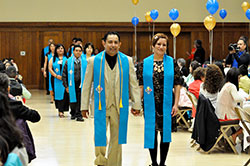Religious Education Supplement
Religious education is relevant to the ‘here and now’ for all Catholics across the archdiocese

Eric Romero and his wife, Ana DeGante, members of St. Ambrose Parish in Seymour, process in with their classmates at a banquet celebrating the first graduating class of the archdiocesan Office of Intercultural Ministry’s Hispanic Leadership Institute on May 11, 2013, at the Archbishop Edward T. O’Meara Catholic Center in Indianapolis. The institute is one of three ethnic pastoral and catechetical formation programs operated by the archdiocesan Office of Intercultural Ministry. (Criterion file photo)
By Natalie Hoefer
Franciscan Brother Moises Gutierrez may be the archdiocesan director of the Office of Intercultural Ministry, but for a moment he plays the role of trivia master.
“Do you know where the word ‘catechesis’ comes from?” he asked. “It comes from a Greek word meaning ‘to echo the teaching.’ ”
And that, he says, is what catechesis—religious education—allows each person to do: to echo the teachings of the Catholic faith, making that faith relevant to everyday life.
This article examines two ways that catechesis is relevant in an everyday way—through intercultural ministry, and through performing works of mercy.
‘Our faith does call us to serve’
Working for Catholic Charities in Terre Haute, development director Jennifer Buell says she is blessed by the nature of her work to take part daily in performing most of the seven corporal works of mercy: feed the hungry, give drink to the thirsty, clothe the naked, shelter the homeless, visit the sick, visit the imprisoned and bury the dead.
“We have a pretty unique opportunity to [perform the corporal works of mercy] every day,” she said. “We don’t do our job because it’s our job—we are here because we want to do what we’re doing, and we’re blessed and lucky enough to do those works as part of our job.”
Blessed and lucky, she said, because every Catholic is called to imitate Christ in serving others.
“We’re called to be that opportunity that someone might need to be able to turn their life around, to receive the food they need, find shelter they need, to help them and their family to really live in a dignified way.”
For Catholics whose jobs do not directly involve the corporal works of mercy, said Buell, there are still many ways to practice each one, thus “echoing the teaching” of Christ.
“The first thing for everyone is prayer,” she said. “Pray for openness to hear what God’s will is for each of us and what he has as opportunities for us to live that out. Sitting in his silence and listening to what his path is for us is an important first step.”
Next, said Buell, Catholics can consider volunteering for organizations that perform works of mercy.
“We see hundreds of people come through to help, whether it’s delivering food, working in a soup kitchen [or] serving as positive role models at the youth center.”
And while giving time and talent are vital, she said, giving of treasure enables others to perform larger works of mercy.
“We can also help out by providing for the least among us through donations,” said Buell. “Those are so important for us to maintain the level of service we provide in our broader community.”
Whether in a small or broad way, said Buell, “Our faith does call us to serve. It does call us to live out the life of Jesus. Through performing works of mercy, we can do that.”
Intercultural catechesis in the ‘here and now’
Many immigrants settling in central and southern Indiana are Catholic. They become members of parishes and worship at Mass.
If they are already Catholic, why is it important to catechize them?
“The role of catechesis in the immigrant communities is teaching our Catholic faith in the context of the Church in the United States,” Brother Moises explained.
“In many cases, immigrants continue using faith formation programs from their native countries. Sometimes it is not easy to let go of the context of the country, culture and reality where we learned our faith. Even though our faith is Catholic, meaning universal, the context of where we live, worship and work have an impact on how we teach and live out our faith.”
To help Catholic immigrants integrate and adjust to the cultural context of their faith, the Office of Intercultural Ministry has created ethnic-based pastoral formation institutes—one for Hispanics, one for Burmese, and one for black Catholics.
The goal of these institutes is to form pastoral and catechetical leaders within the various ethnic communities.
“The role of the catechists in the immigrant community is important and even imperative because they are the ones who pass on to the next generations the teachings of our faith,” Brother Moises said.
While these catechists are learning to share the faith in the context of the American culture, he said, “They [also] understand and appreciate their community’s native culture and spirituality.”
As the number of immigrant Catholics increases, said Brother Moises, the need for native catechists to teach their communities the relevance of the faith in the “here and now” also grows.
“I personally believe that well-formed catechists from immigrant communities are a great blessing for the archdiocese because they have the potential to be intercultural catechists, which means that they can catechize in the context of our reality here and now, while presenting and witnessing a catechesis that appreciates and values diversity.
“Catechizing is one of the main missions for Catholics,” said Brother Moises. “Without good catechesis, it would be difficult to evangelize or to be pastoral leaders in our Church.
“Therefore, our hope is that we are forming leaders that are able to ‘echo’ the teachings of our faith in word and deed; to ‘echo’ the faith that was passed onto us through our parents, our culture and our present context in a way that is mutually transformative and alive.” †
